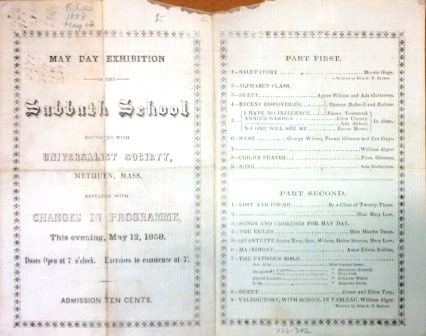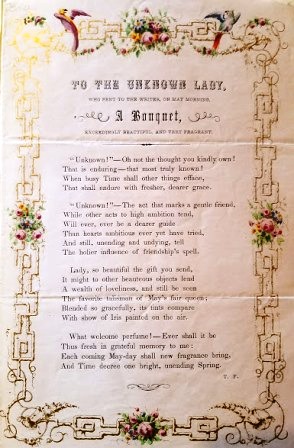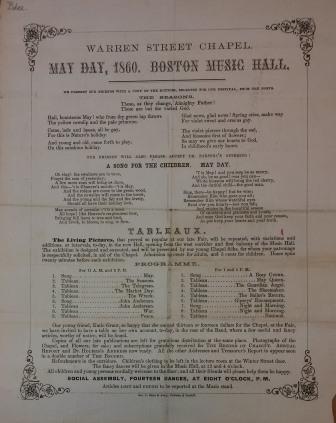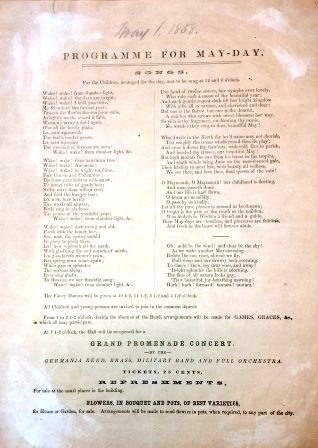By Rakashi Chand, Reader Services
Today is the 1st of May, a day once celebrated with merriment, song, dance and baskets. The celebration of May Day originated in pre-Christian Europe as a festival to celebrate the coming of Spring and the first planting. The boisterous celebrations of May Day suffered a bit with the onset of Christianity, but what emerged was a more innocent and beautiful festival. It was this festival, brought over from Europe, which reached its peak in nineteenth century America. Bostonians celebrated May Day with concerts, dances, and by making May Day Baskets.

May Day exhibition of the Sabbath School connected with the Universalist Society of Methuen, Mass…
The May Day holiday was perhaps the loveliest of all celebrations. Adorned in flowers and beautiful colors, this was a day to truly celebrate beauty, friendship and happiness, as well as the coming of spring and all the wonderful sights, smells, tastes and feelings that accompany the warmer months. The holiday was as sweet and as beautiful as the season it heralded. May Day baskets were often homemade baskets that would be filled with freshly picked flowers, sweets, and sometimes even small gifts, to be left on the doors of friends, neighbors and possibly even a romantic interest. The May baskets were secretly hung on the door of friends and loved ones on May 1st.
In 1850, a Massachusetts man named Thomas Power composed an ode (below) to an unknown woman who presented him with a May Day basket.

…Lady, so beautiful the gift you send,
It might to others beauteous objects lend
A wealth of loveliness, and still be seen
The favorite talisman of May’s fair queen;
Blended so gracefully, its tints compare
With show of Iris painted on the air.
What welcome perfume! –Ever shall it be
Thus fresh is grateful memory to me:
Each coming May-day shall new fragrance bring,
And Time decree one bright, unending Spring.
150 years ago the city was rife with concerts and dances to celebrate May Day. Children jubilantly danced around May Poles as their rite of Spring, and schools held assemblies and choral concerts. Adults and children alike enjoyed the festivities, songs, and dances that accompanied the festivals.
One such event was sponsored by the Warren Street Chapel in 1860. The festivities that took place at the Boston Music Hall included poems, songs like Dr. Parson’s “A Song for the Children. May Day,” and the very fashionable tableaux, “The Living Pictures,” which had swept over Europe and then became vogue in America. The entire thing wrapped up with a “Social Assembly, Fourteen Dances, at Eight O’Clock, P.M.”

May Day, 1860: Boston Music Hall
Another celebration held in 1858 featured songs specially arranged for the day and to be sung at specific times; “Fancy Dances” held at set times throughout the day; “Games, Graces, &c.” to occupy revelers during lulls in the music and dancing; and in the evening, a “Grand Promenade Concert” performed by the Germania Reed, Brass, Militrary Band and Full Orchestra.” In addition, visitors could purchase bouquets and potted flowers to take home (with delivery to any part of the city an option).

So, consider rekindling some of these bygone May Day traditions and festivities. Prepare a basket, sing a song, and dance a dance, and celebrate the season with these words:
Oh! Mild be the wind! And clear be the sky!
As we wake another May-morning.
Before the sun rises, abroad we fly,
Dull sleep and our drowsy beds scorning,
To dance! Then, my dear ones, and away!
Bright splendor the hills are adorning.
The face of all nature looks gay,
‘Tis a beautiful, joy-breathing morning!
Hark! hark! forward! tantara! tantara!
Have a lovely May Day!
Sources
– Encyclopaedia Britannica online, “May Day: European seasonal holiday.” Accessed 30 April 2018 at https://www.britannica.com/topic/May-Day-European-seasonal-holiday.
– Weeks, Linton, “A Forgotten Tradition: May Basket Day.” NPR History Department, 30 April 2015. Accessed 30 April 2018 at https://www.npr.org/sections/npr-history-dept/2015/04/30/402817821/a-forgotten-tradition-may-basket-day.
– “The May-Day Festival: Symposium,” Francis W. Parker School Year Book, Vol. 2, The Morning Exercise As A Socializing Influence (June 1913), p. 150-157. Accessed 30 April 2018 at http://www.jstor.org/stable/41102642

